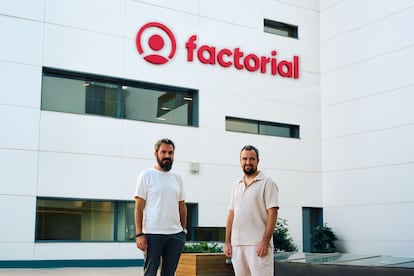Unicorn Factorial reaches $100 million in revenue: "Profitability isn't our concern; the important thing is having cash to keep growing."


The startup Factorial, which became a unicorn in 2022 after reaching a valuation of $1 billion , has reached another symbolic milestone: revenue, reaching $100 million in revenue. “In the startup world, the concept of valuation has become very fashionable, but the ecosystem itself has seen that it doesn't always reflect the true size of a startup,” explains Jordi Romero, CEO and co-founder of Factorial, via video call. “Revenue shows that there is a market behind our offering, and in our category, there are very few companies in Europe that have reached $100 million, let alone that have our growth rate, which is 70% per year,” he adds. However, revenue alone doesn't show whether the business is solid or not. Factorial doesn't share data on its net income or gross operating profit, but Romero explains that the startup is not yet profitable. "Profitability doesn't concern us, because what's important to us is cash flow. As long as we have cash to grow and don't depend on investors, our priority is growth," explains the executive.
Romero founded the company with Bernat Farrero and Pau Ramon in 2016, but it wasn't until 2019 that they found their business model: providing technological services so that small and medium-sized businesses that hadn't digitized their human resources processes or had done so precariously would have an efficient technological tool to do so. This human resources management platform has eventually become a comprehensive business management program that provides services to more than 14,000 companies in 10 countries. "We actually started charging for the software six years ago, and reaching $100 million in revenue in just six years is an important milestone," Romero explains.
Like all startups , Factorial has relied on several investment rounds from the start, the latest being $120 million in 2022, led by Atomico, which boosted the company's valuation and turned it into a unicorn. Since then, they haven't raised any new investment rounds: "We're a company that grows rapidly and doesn't consume cash, because we finance our growth with the resources we have from our clients," Romero explains.
This growth means strengthening its presence in Spain while also expanding into new markets—the company recently opened offices in Cologne, Germany, with around twenty employees, and this month will inaugurate its new headquarters in Barcelona to accommodate its 1,400 employees, who have added 500 jobs this year—and also investing heavily in product development. “For that, it's very important to have a good cash flow, and we have it,” the executive notes.
Cash flow comes from customers, but the venture capital fund General Catalyst plays an important role here. In April 2024, this fund signed an $80 million investment ( which it increased to $200 million a year later ) to finance the startup 's growth. Customers don't pay large subscriptions, but rather pay as they use the service, and the fund advances to Factorial the cash flow it would ultimately achieve from customers . For now, profitability isn't an issue: "We're not worried; the important thing is cash flow, and the priority is growth. Logically, the more customers and business we have, the closer we'll get to profitability," says Romero, who emphasizes that economies of scale are key for this company.
The next goal now is to reach $1 billion. “We've discovered that Factorial is in a very large market, we're growing very rapidly in Italy, France, and Portugal, because we solve a problem that many companies face,” Romero explains. Given this growth, Factorial has already received acquisition offers, but the founding team has no intention of selling: “We like what we do and we don't need anyone's help. Our goal is to remain independent and continue growing.”
EL PAÍS





